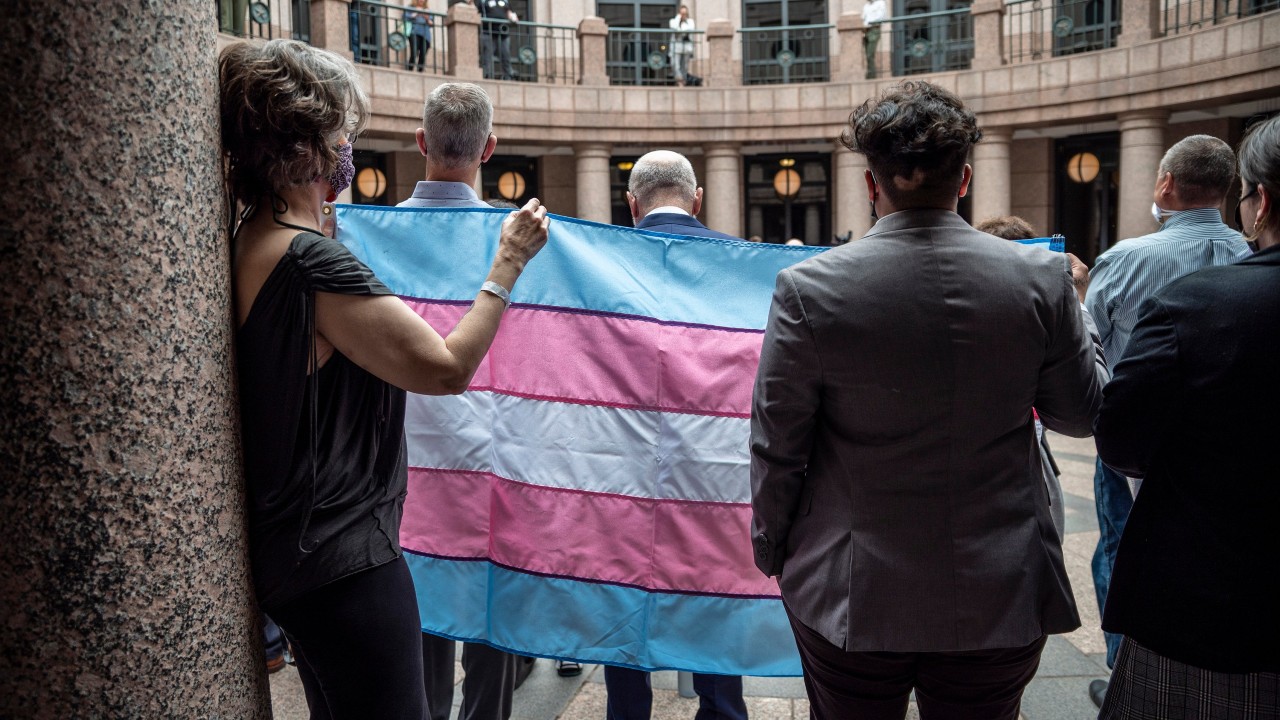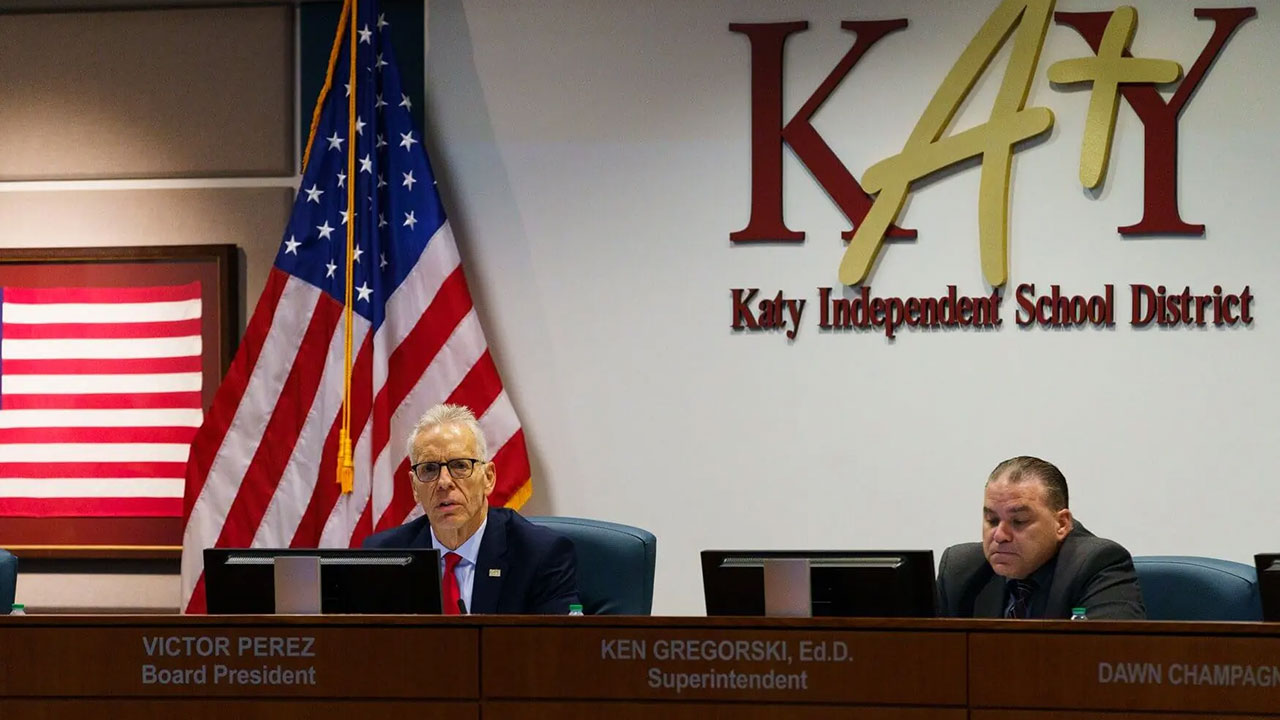Texas
Treatment for Transgender Kids Becomes Litmus Test for Texas Republicans
The issue is no longer contained to just the party’s fringes — and it is unlikely to go away any time soon as the national fervor grows, Gov. Greg Abbott’s directive faces legal challenges and it factors prominently into a slew of GOP primary runoffs.

This article originally appeared in The Texas Tribune
 Gov. Greg Abbott sparked a national uproar last month when he authorized child-abuse investigations into families that allow transgender kids to receive gender-affirming care.
Gov. Greg Abbott sparked a national uproar last month when he authorized child-abuse investigations into families that allow transgender kids to receive gender-affirming care.
But the political momentum toward the move had been building for months, after the failure at the Legislature of a bill to block such treatments for kids paved the way for executive action amid a competitive primary season. Along the way, the issue emerged as a new litmus test for Texas Republicans.
The issue is no longer contained to just the party’s fringes — and it is unlikely to go away any time soon as the national fervor grows, Abbott’s directive faces legal challenges and it factors prominently into a slew of GOP primary runoffs.
“This is a winning issue,” Abbott’s top political strategist, Dave Carney, told reporters last week, brushing off any general-election concerns. “Texans have common sense.”
Abbott’s directive came shortly after the attorney general, Ken Paxton, issued a legal opinion classifying certain types of gender-affirming care as child abuse. Within days, the state was investigating a family after the parents received such treatment for their 16-year-old transgender daughter. The American Civil Liberties Union and Lambda Legal sued on the family’s behalf, and a state district judge temporarily blocked the investigation but did not stop Texas from opening other, similar probes.
On Friday, Texas Children’s Hospital, the largest pediatric hospital in the country, said it was ending prescription of gender-affirming hormone therapies in response to Abbott’s directive. Another major hospital, University of Texas Southwestern Medical Center, closed a clinic for transgender teens last year. On Tuesday, The New York Times reported that the clinic had faced pressure from the governor’s office in the days before it dissolved.
Texas Republicans’ growing focus on what they call “child gender modification” is the latest illustration of the state’s swing to the right after the 2020 election. And it reached an apex as both Abbott and Paxton were in the final days of primaries where they were getting pressured from their right over the issue.
Conservatives pushing the initiatives say they are protecting children from making dramatic changes to their bodies before they are old enough to understand the ramifications. LGBTQ advocates say permanent treatments almost never happen in children and that Texas Republicans are making a cynical play with a vulnerable population with legitimate treatment needs in the crosshairs.
“I think what is happening here is that anti-LGBT politicians realize it’s politically advantageous to attack a minority or marginalized community that people know very little about,” said Ricardo Martinez, CEO of Equality Texas. “They are exploiting that knowledge gap … with disinformation about who transgender people are as a fear tactic.”
Caught in the political crossfire are parents like the Baizes, who have a transgender son. Melissa Baize lived in Fort Worth for 15 years before her family left the state last year, concerned about the ramp-up of legislation targeting trans children.
Baize said it’s been painful and surreal to be on the receiving end of political attacks from the state’s most powerful leader.
“As a parent, you try so hard to protect your kids whether they’re straight or gay or trans or anything,” Baize said. “And to have someone who’s in power, who has a voice out there and is saying that this is wrong and you need to turn on these people.”
Baize said she considered Fort Worth her home, and her husband was born and raised in Texas. But she said “we’re never going back, especially now” with the new directive.
From “bathroom bill” to now
The fight over gender-affirming care is the biggest policy battle in Texas over LGBTQ rights since the 2017 “bathroom bill” that sought to restrict which restroom transgender Texans could use. The legislation, a priority of Lt. Gov. Dan Patrick, never reached Abbott’s desk, stymied by stubborn opposition from the business community and then-state House Speaker Joe Straus, a Republican.
When the bathroom bill was first introduced, Baize’s son was just 10 years old. But she said her son understood then that lawmakers were talking about kids like him. He started to feel afraid to use the bathroom he felt more comfortable in. That was the beginning of the stress that prompted them to leave town.
“We thought, if this is always going to be going south for us, it’s not going to be good for us as a family as a whole,” Baize said. “We needed to get our family back on track, and we needed to be somewhere safe.”
A good amount has changed since then for Republicans. In 2020, the GOP defeated the most serious effort in recent memory to turn the state blue and then used the redistricting process last year to shore up its majorities for the next decade. Combined with a national environment favoring the GOP in November, that laid the foundation for Texas Republicans to return to a time when the primary is far more consequential for them than the general election.
It was against that backdrop last year that the GOP-led Legislature, with Abbott’s support, became a red-meat factory, churning out laws that almost totally banned abortion, allowed permitless carry of handguns and tightened Texas’ already stringent voting rules. Some called it the most conservative session ever.
That year, Republican leaders moved forward on legislation targeting trans athletes that forced student to play on teams based on their sex at birth. That proposal failed in the regular session but passed in a special session after Abbott prioritized it.
Even as Republicans raced to the right on a host of issues, though, going after transition-related medical care for transgender kids remained on the back burner. Despite the efforts of some of the farthest-right members — and passage in the Senate — it never made it through the House.
Straus’ modern-day successor is Dade Phelan, a Republican from Beaumont who initially gave LGBTQ advocates cautious optimism due to his 2019 comment saying he is “done talking about bashing on the gay community.” But their optimism dimmed when he allowed the bill on transgender student athletes to reach the floor last year.
Still, through four legislative sessions last year, Phelan and his leadership team were able to keep off the floor an array of proposals targeting gender-affirming care for minors. That laid the groundwork for it to become a primary-season issue when the Legislature finally gaveled out in October — and raised the possibility that Abbott would have to take executive action to appease his right.
It was not long before the issue became a political liability for both Paxton and Abbott. Paxton got flack from some of his primary opponents who wanted to know why he was taking so long to formally weigh in on whether gender-affirming treatments constituted child abuse. The request for the legal opinion came in August from state Rep. Matt Krause, R-Fort Worth, who would go on to wage a short-lived challenge against Paxton in his primary that fall.
Meanwhile, Abbott got badgered over the issue by primary challengers including Don Huffines, a former state senator from Dallas.
“Texans deserve a governor who will fight against the radical Leftist sickos and end their war on children,” Huffines said in one statement.
Another Abbott challenger, former Texas GOP chair Allen West, was able to crusade on the issue long before he launched his campaign because it was one of the legislative priorities of the state party he led.
Paxton released his opinion on Feb. 21, the middle of the early-voting period for the March 1 primary, and Abbott issued his directive the next day.
Paxton advanced to a runoff in his primary, and Abbott easily won his outright with nearly two-thirds of the vote. He now faces a Democratic opponent, Beto O’Rourke, who has criticized the directive, pledging to protect transgender children in Texas and more broadly expand LGBTQ rights in the state.
Abbott’s campaign is not worried about the fallout.
“That is a 75-to-80% winner,” Carney, the Abbott strategist, said during a call with reporters the morning after the primary. “I don’t believe that even O’Rourke would think that if a parent cut off the hand of their kid, it wouldn’t be considered child abuse.”
There has not been any public polling on the issue recently in Texas. But the state’s Republicans overwhelmingly backed a primary ballot proposition last week calling for a ban on “chemical castration, puberty blockers, cross-sex hormones, and genital mutilation surgery on all minor children.” (Medical experts say surgeries and irreversible treatments for transgender children are exceedingly rare.) The proposition got 93% support, and it was the third most popular among the 10 nonbinding propositions that appeared on the ballot.
“Clearly as of right now, the Republicans feel safe enough to do as they please,” said Andrew Sanders, an assistant professor of political science at Texas A&M University-San Antonio. “They’re definitely feeling confident that this is an agenda that can keep them in power.”
Business breakup
Another thing that has evolved since 2017 is Republicans’ relationship with the business community.
Once a bedrock constituency of the GOP, Big Business has found less of an audience with state GOP leaders as it seeks to influence them on social issues, at least publicly. A stark illustration of that came last year when American Airlines came out against the Republican-backed voting bill — and Patrick went on a rampage against it, essentially making an example out of the Fort Worth-based company.
”Stay out of things you don’t know anything about,” Patrick said at the time, “and if you want to get involved, then you’re taking that risk.”
Businesses are taking notice of the fierce blowback they can incur from the highest levels of state government. The Texas Association of Business, which was instrumental in stopping the bathroom bill, did not respond to a request for comment on Abbott’s directive on transgender youth.
The TAB was a top organizer of bathroom bill opposition in 2017. Opponents also got a boost when the NFL warned the Legislature against passing the legislation, suggesting it could impact future games in the state.
There has nonetheless been noteworthy business opposition to Abbott’s recent directive. Texas Competes, a coalition of over 1,400 businesses and business groups that advocates for LGBTQ rights, issued a statement saying it was “gravely concerned” about the directive.
“When Texas sends this dangerous message, it is at stark odds with our members’ values and competitiveness — especially in a climate where all sectors have struggled to recruit and retain a talented workforce,” the statement said.
Jessica Shortall, the managing director of Texas Competes, said in a separate statement that the group has “heard from several big employers that the outreach — and outrage — from their workforce exceeds even what they experienced in the 2017 bathroom bill fight.”
How much that means to Abbott and other state Republican leaders is an open question. Matt Rinaldi, the Texas GOP chair who was serving in the state House during the bathroom bill battle, argued in an interview that Patrick was “really ahead of the game” in going toe-to-toe with the business community in 2017.
“You’re seeing now that people are realizing that Big Business is quickly siding with the most extreme elements of the Democratic Party,” Rinaldi said, “and the Republican Party, in one of the largest political realignments we’ve seen in a while, is becoming the party of small business, working Americans and parents.”
Not going away
The national attention over the directive is not receding.
U.S. Health and Human Services Secretary Xavier Becerra has said his agency is looking into what it can to help transgender kids in Texas in light of the directive. During his State of the Union speech, President Joe Biden decried the “onslaught of state laws targeting transgender Americans and their families.” And on Tuesday, White House press secretary Jen Psaki said the Texas policy was “discriminating against exactly the kind of kids who we need to be loving and supporting.”
Paxton appealed the judge’s ruling that halted the first known investigation to stem from the directive, but a court rejected the appeal Wednesday. That means a Friday hearing can proceed over whether the district judge will issue a statewide injunction blocking all such investigations.
Then there are the electoral ramifications going forward. Paxton is in a primary runoff against Land Commissioner George P. Bush, who has criticized Paxton’s opinion as an empty gesture, citing the money he has “accepted in campaign funding from gender transition clinics for illegal immigrants.” That is a reference to Paxton’s financial support over the years from Border Health PAC, the political arm of DHR Health in the Rio Grande Valley, which in 2017 opened a Gender Care Clinic at its Family Medicine Center.
It is unclear if that clinic is still operating. A DHR Health spokesperson did not respond to a request for comment for this story.
There are also at least two Republican primary runoffs for state House in which transgender rights rank as a leading issue. State Rep. Stephanie Klick of Fort Worth, the chair of the House Public Health Committee, is in a runoff against a challenger, David Loewe, who has been attacking her for not doing enough to stop “gender modification.” It is also a top debate in a runoff for an open seat in which one of the candidates is Jeff Younger, a North Texas father who came to prominence through a protracted custody battle involving a transgender child.
“I know how to use political power,” Younger wrote Tuesday on Facebook, sharing the news about Texas Children’s Hospital. “My five year campaign to shut down these barbaric abuses is bearing fruit.”
Baize said it’s still hard to watch what’s happening in her home state.
“It’s like, you pick on the weakest ones you can to get ahead, to get the attention they need.” Baize said. “They’re just bullies, and the worst kind to just keep attacking and attacking and attacking. And then thinking of new ways to attack us more and more.”
Sneha Dey contributed reporting.
Disclosure: UT Southwestern Medical Center, DHR Health, Equality Texas, Facebook, Texas A&M University, Texas Association of Business and The New York Times have been financial supporters of The Texas Tribune, a nonprofit, nonpartisan news organization that is funded in part by donations from members, foundations and corporate sponsors. Financial supporters play no role in the Tribune’s journalism. Find a complete list of them here.
The Texas Tribune is a nonpartisan, nonprofit media organization that informs Texans — and engages with them – about public policy, politics, government and statewide issues.
Education
Feds investigate another Texas school district for its gender identity mandate
Katy ISD’s board voted this past fall to require staff to notify parents if their child wants to use a different pronoun or identifies as a different gender.

This article originally appeared in The Texas Tribune
 The U.S. Department of Education’s Office for Civil Rights opened an investigation Monday into Katy Independent School District’s gender identity policy on the basis of gender harassment under Title IX. The investigation came nine months after the Houston Landing reported that the district adopted a policy that notifies parents if their child requests to use a different name or pronouns at school.
The U.S. Department of Education’s Office for Civil Rights opened an investigation Monday into Katy Independent School District’s gender identity policy on the basis of gender harassment under Title IX. The investigation came nine months after the Houston Landing reported that the district adopted a policy that notifies parents if their child requests to use a different name or pronouns at school.
Katy ISD did not respond to a request of how many parents have been notified this year under the new policy, which requires staff to inform parents that students are transgender or ask to use different names or pronouns.
The Houston Chronicle reported in December that the district had notified parents at least 23 times since the policy was adopted.
The gender identity policy also bars schools from teaching “gender fluidity” and denies students from competing in sports with the gender they identify with, which mirrors state legislation already regulating K-12 athletics.
Students Engaged in Advancing Texas, a student-led advocacy group, filed a complaint with the U.S. Department of Education in November regarding the policy. Katy ISD graduate and member of SEAT Cameron Samuels labels the investigation as a win against the conservative policies being passed in the district.
“Elected solely on platforms to target marginalized students, far-right school board candidates accomplished exactly what they were elected to do: weaponize identity and neglect students’ educational needs,” they said.
Title IX prohibits sex-based discrimination in educational settings or federally funded activities. Gov. Greg Abbott has loudly voiced his opposition to the federal law recently ordering the Texas Education Agency to disregard the Biden administration’s expansion of Title IX.
“The district is committed to offering equal educational opportunities to our entire community,” a spokesperson from Katy ISD told the Tribune in a response to the investigation. “While we have received the OCR filing and deny any wrongdoing, we are committed to remaining fully cooperative and responsive throughout the process.”
Victor Perez, Katy ISD board president and proponent of the policy, argued that the policy was “mischaracterized” by community members as an attack on its queer and transgender students and instead relieves the burden for staff withholding information from parents. The policy was passed at a board meeting in August with a vote of 4-3 after four hours of public comment.
Alastair Parker, a member of the Cinco Ranch High School Gender-Sexuality Alliance, spoke at the board meeting in opposition to the policy.
Parker and others argued that the policy infringes on the rights of transgender kids to express themselves and opens them to potential harm if they are outed to transphobic parents or caregivers.
Johnathan Gooch from Equality Texas, a nonprofit advocacy group for LGBTQ+ Texans, said he hopes students recognize their power to report policies like this in the wake of the increasing number of legislation targeting LGBTQ+ youth.
This isn’t the first instance in Texas of a gender related policy being investigated on the federal level. Carroll ISD in Tarrant County was reported to have eight open investigations last February after it eliminated protections over race, religion, gender and sexual orientation.
There are documented mental health benefits to using preferred pronouns. A research team at the University Texas at Austin conducted a study in which they concluded that students in gender-affirming environments report 71% fewer symptoms of severe depression, a 34% decrease in reported suicidal ideation and a 65% decrease in suicide attempts.
“When students place their trust in teachers and school administration, the school has a duty to preserve that trust,” Gooch said. “That duty requires schools to ensure that no disclosure would place a student in harm’s way.”
Parker has been out as a transgender man since the seventh grade and is supported by his father, who he resides with. He acknowledged that this isn’t the case for many of his classmates as some have parents that are less accepting.
His teachers have gone by his preferred name and pronouns for his entire high school experience. But since the policy has been enacted, he has seen some of his peers go by their deadnames fearing that their parents would be notified.
Over the past year, other schools across the state have adopted similar policies.
Keller ISD, which is also in Tarrant County, passed a policy in late June that prevents students from using their preferred name and pronouns or using restrooms with the gender they identify with.
The policy was met with retaliation from the Texas American Civil Liberties Union, writing in a letter to the district that the policy is “deeply invasive and unlawful for school administrators to interrogate students’ private medical information in this way.”
As the end of the school year nears, Parker observed the policy being enforced at varying levels of severity by teachers. The passing of legislation or policy like this deters from the ongoing health crisis for queer and transgender youth and is wholly unnecessary, he said.
“If a child’s not telling their parents something like that, it’s for a reason,” he said. “I know that most of the people who are in favor of this are the ones who bounce off whatever their parents have told them to repeat.”
Disclosure: Equality Texas has been a financial supporter of The Texas Tribune, a nonprofit, nonpartisan news organization that is funded in part by donations from members, foundations and corporate sponsors. Financial supporters play no role in the Tribune’s journalism. Find a complete list of them here.
The Texas Tribune is a nonpartisan, nonprofit media organization that informs Texans — and engages with them – about public policy, politics, government and statewide issues.
Amarillo
Appeals court considers whether West Texas A&M drag show was unconstitutionally banned
University President Walter Wendler canceled a drag performance last year, claiming such shows “denigrate and demean women.”

This article originally appeared in The Texas Tribune
 A federal appeals court considering whether West Texas A&M University’s president violated the First Amendment when he canceled a campus drag show last year focused many of their questions Monday on a U.S. Supreme Court ruling that upheld campus non-discrimination policies.
A federal appeals court considering whether West Texas A&M University’s president violated the First Amendment when he canceled a campus drag show last year focused many of their questions Monday on a U.S. Supreme Court ruling that upheld campus non-discrimination policies.
But the panel of three judges used that 2010 case — which said universities can require groups to admit LGBTQ+ students — to suggest that school officials could also ban drag shows because some people find the performances offensive to women.
A lawyer representing a group of West Texas A&M students who’ve twice attempted to host a drag show on campus argued before the 5th U.S. Circuit Court of Appeals Monday that President Walter Wendler discriminated based on viewpoint and censored speech when canceling the performances.
In March 2023, Wendler banned drag shows in response to a student fundraiser that featured drag performers. The president argued the performances “denigrate and demean women,” and shouldn’t be allowed on the public university’s campus.
In September, a federal judge said Wendler acted within his authority to cancel the drag show. In his opinion, U.S. District Judge Matthew Kacsmaryk wrote, at “this point in Free Speech jurisprudence, it is not clearly established that all ‘drag shows’ are categorically ‘expressive conduct.’”
Last month, students with WT Spectrum, the student group at the university, hoped to hold another drag show on campus — to show support for the LGBTQ+ community in a staunchly conservative corner of Texas.
With Wendler’s campus-wide ban still in place, the Supreme Court declined to intervene and the president again ordered the fundraiser from taking place.
The panel of judges hearing the appeal Monday were James Dennis, James Ho and Leslie Southwick.
Many of their questions centered around Christian Legal Society v. Martinez, a case in which the Supreme Court upheld a policy of the University of California, Hastings College of the Law, that bars student groups from excluding members based on status or beliefs.
In 2010, the Supreme Court affirmed that Hastings’ policy does not violate the First Amendment rights of CLS, a group of students that wanted to be officially recognized on campus while not allowing people who engage in “unrepentant homosexual conduct” from joining.
The 5th Circuit judges Monday seemed to suggest that Wendler’s ban was no different from the policy at the center of the 2010 Supreme Court case. One of the judges, who didn’t identify themselves before speaking, asked if plaintiffs intended to use the case in question to overturn CLS.
“Maybe we should overturn CLS?” one of three judges said. “Many people would like CLS overturned.”
Ho equated the policy upheld in CLS with Wendler’s drag ban. He said both intend to make everyone feel included, but the policies have the consequence of targeting one group. In CLS’ case, he said that Christians were singled out on Hastings’ campus for not allowing LGBTQ+ individuals to join. Ho said that previous groups on Hastings’ campus could exclude members, but CLS was singled out by the university’s non-discrimination policy.
JT Morris, senior attorney for the Foundation for Individual Rights and Expression who represented the students, argued that the judges were comparing “apples to oranges” between the two cases.
Morris argued CLS is about a content-neutral policy, while Wendler was clearly discriminating based on viewpoint.
“The First Amendment does not allow the government to use the subjective term ‘offensive’ to restrict speech,” Morris said.
Joseph N. Mazzara, a lawyer with the Texas Attorney General’s Office who represented Wendler, said the students had not suffered any injury as a result of the no-drag policy because there was no future event featuring drag performers planned. Additionally, Mazzara said Wendler’s policy carried no criminal penalties and students could host drag performances off campus.
Mazzara said Wendler’s ban was not a free speech violation, but rather it was akin to banning certain conduct, like skateboarding on the grounds of a monument. He said drag shows constituted conduct, not speech.
“They’re able to do everything they want to do, they’re able to say all the speech they want to [say],” Mazzara said, referring to the student group WT Spectrum. “They just can’t do this one particular thing in this one particular place.”
A judge asked Mazzara how the university would have treated drag shows put on by other student groups, such as a fraternity. The judges seemed to agree with Mazzara that Wendler’s restriction did not target a specific viewpoint.
“If a Christian legal group wanted to have a ‘Drag for Jesus’ event that would also be banned,” Mazzara said.
One judge suggested that some drag shows are offensive to the transgender community, and thus Wendler’s ban would equally protect that population from offensive performances.
Allison Marie Collins, another lawyer from the Attorney General’s Office representing other defendants named in the lawsuit, argued the appellate judges should not impose any restrictions on Texas A&M system Chancellor John Sharp or West Texas A&M Vice President for Student Affairs Christopher Thomas. She argued an injunction against Sharp or Thomas would be overbroad, because it’s clear that only Wendler has acted to stop these shows.
“Neither Chancellor Sharp nor Dr. Thomas have remotely engaged in viewpoint discrimination, exclusion from a public forum or a prior restraint complaint to speech,” Collins said.
In his rebuttal, Morris argued the plaintiffs have standing over Sharp because he has the authority over Wendler to put an end to this restriction on free speech.
“He has the authority to do what’s best for the campus,” Morris said of Sharp. “He should have put an end to this prior restraint, which shouldn’t have lasted a day, and has now lasted a year.”
Disclosure: Texas A&M University and West Texas A&M University have been financial supporters of The Texas Tribune, a nonprofit, nonpartisan news organization that is funded in part by donations from members, foundations and corporate sponsors. Financial supporters play no role in the Tribune’s journalism. Find a complete list of them here.
The Texas Tribune is a nonpartisan, nonprofit media organization that informs Texans — and engages with them – about public policy, politics, government and statewide issues.
Education
Under Katy ISD gender policy, student identities disclosed to parents 19 times since August
Public records obtained by the Houston Landing offer the first glimpse at how often the new, hotly contested policy has been used to disclose LGBTQ+ students’ identities to parents — even if the students aren’t ready.

 Since narrowly passing a controversial gender policy two months ago, Katy Independent School District has sent 19 notifications informing parents that their child identified themselves as transgender or requested to use different names or pronouns at school.
Since narrowly passing a controversial gender policy two months ago, Katy Independent School District has sent 19 notifications informing parents that their child identified themselves as transgender or requested to use different names or pronouns at school.
The number of parental notifications, obtained by the Houston Landing through a public records request, is the first glimpse at how often the new, hotly contested policy has been used to disclose LGBTQ+ students’ identities to parents — even if the students aren’t ready.
So far, the district averages a notification to a parent roughly once every three days.
The district’s policy requires staff to inform parents if their student requests to use different pronouns or names, or if they identify themselves as transgender — and obtain written parental consent to comply with the request. It also prohibits employees from asking for students’ preferred pronouns and discussing “gender fluidity,” and requires students to use bathrooms that align with their sex assigned at birth.
Jarred Burton, a student leader at Tompkins High School’s Sexuality and Gender Alliance, said the number of notifications already sent to parents is both depressing and surprising. Critics, including Katy parents, LGBTQ+ students and local advocates, have blasted the policy as a dangerous measure with the potential to expose students’ gender identities to unsupportive parents, further harming a community that already faces a higher risk of mental health issues than their peers.
“It’s just sad to see this actually happening,” Burton said. “It shows that (the policy) is not a bluff.”
Board members who supported the policy hailed it as a measure that would center parents’ right to be informed about their child’s gender identity and protect teachers from making uncomfortable decisions about concealing such information from parents.
“(Parents are) supposed to be looking after the health and welfare of their child,” Board President Victor Perez said at a late August meeting. “Withholding that information from the parent, that is a great burden on staff.”
It’s unclear how many parents were already aware of their child’s gender identity. District officials also did not make any board members available for an interview on the matter.
“The policy is intended to provide parents and guardians the opportunity to be made aware of their child’s name change request, and the opportunity to grant or deny approval of said request,” Katy spokesperson Nick Petito said in a statement Wednesday.

Ash Thornton, a transgender man and a junior at Tompkins High School, said the number of notifications being sent home will discourage LGBTQ+ students from feeling safe to explore their identities.
“It signals that it’s something bad, them being transgender or expressing gender in a way that’s different,” Thornton said. “It definitely messes up student-teacher relationships.”
Employees are not required to comply with a student’s name or pronoun change even if a parent gives consent, the policy states.
One staff member on every campus is responsible for processing and sending notifications to parents and guardians, Petito said. The policy makes an exception for “cases of suspected abuse.”
Students belonging to LGBTQ+ clubs have told the Landing the policy has caused their schools to become less of a safe space and has instilled fear among LGBTQ+ youth in Katy.
“There’s just been this looming cloud of dread over a lot of people,” Burton said in a September interview. “There’s gonna be a lot of people that get in trouble by their parents or get hurt. … It just sometimes keeps me up at night a little bit because it’s hard to imagine how much hate people can have to pass something like this.”
The number of notifications sent to parents to date leaves Thornton to wonder what else is to come.
“It’s only been two months and there’s already 19, how many more people are going to be affected by even just the end of the semester?” he said.
The Houston Landing is a nonprofit newsroom devoted to public service journalism for all Houstonians.
This article first appeared on the Houston Landing and is republished here with permission.















